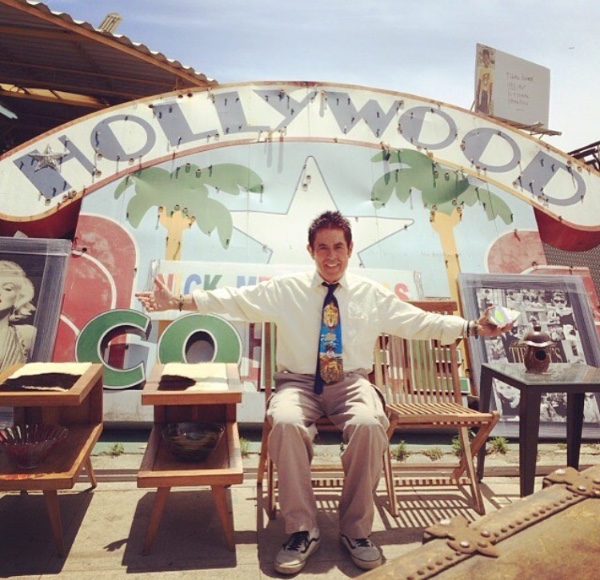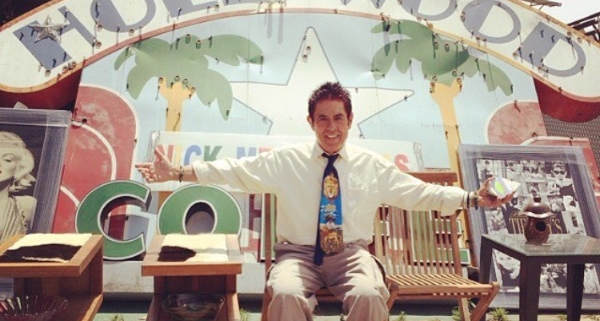Step into the world of Nick Metropolis

One day, USC alumnus Alex Park was driving down West Adams Boulevard when he saw something that caught his eye: a collection of signs outside a prop store. “Love, love, love,” the signs read.
Park immediately called his boss, musician Allen Sovory, and told him about the signs. The two were working on an event together, and the love signs were the perfect prop. The shop Park spotted was Nick Metropolis Collectible Furniture, owned and operated by its namesake, Nick Metropolis.
Growing up, Metropolis, 76, wanted to be a priest, a vet and a rockstar. But ultimately, he became a collector of incredible antiques. Now, with his Martin Short-esque demeanor and spiky magenta hair, Metropolis is starting over. At his new West Adams location, he hopes to reengage with the community and spread his gospel of love and kindness.
Metropolis, the child of Greek immigrants, spent his youth in Rochester, N.Y. and at age 19, moved to Los Angeles in pursuit of a music career. He wanted to be like Bob Dylan or one of the Beatles.
“I resemble George Harrison,” Metropolis said, with his broad smile and kind eyes reminiscent of the youngest Beatles. Within a week of being in L.A., he landed a job at ABC.
“I did camera blocking for the Rolling Stones,” Metropolis said. “I was there at every Sonny and Cher recording session. I met Boris Karloff singing ‘Monster Mash.’ One of the Kinks came into my humble little apartment for a party.”
After that, Metropolis dabbled in acting, and from there, he began selling his collectibles: signs, old Hollywood props, furniture and other tchotchkes. At first, he sold his wares on street corners.
Then, in the late 1980s, Metropolis started selling out of his mechanic’s parking lot. For five years, he spent the weekdays scavenging, and on the weekends, he would show up at the mechanic’s with five 15-foot trucks full of his collectibles. Once the mechanic had closed for the weekend, he would unload all his wares.
When Hollywood tour buses passed by Metropolis’ makeshift business, the guide would tell tourists, “You are now looking at the biggest garage sale in the world,” Metropolis said.
On Sunday nights, after he was done selling, Metropolis lugged the leftover furniture to five different storage units all over the city.
After five years, a corner shop on La Brea and 1st Street became available, and that’s when Metropolis officially opened Nick Metropolis Collectible Furniture.
During the La Brea years, Metropolis’ store became an L.A. landmark. Celebrity and pedestrian collided at the shop, smashed together by Metropolis’ quirky Hollywood glamor. He would feed unhoused Vietnam War veterans in the same place that Lana Del Rey and Miley Cyrus would shop, Metropolis said.
Despite his renown, running the La Brea shop was never easy. He would ring up relatives on the East Coast, begging for money to keep his shop afloat. He tried different business ventures; when a producer pitched a reality show, Metropolis filmed a sizzle reel. The show, however, was never picked up.
In 2017 the shop was robbed, and shortly after, the rabbi who owned the building that Metropolis rented from — and who was easy with late rent — died. “He was the kindest,” Metropolis said.
When the property came under new ownership, Metropolis’ rent shot up $8,000. The whole block was being gentrified, he said.
Metropolis was in debt, unable to keep up with the rent and without his lenient landlord. Joanna Friedman, a director who had been working on a documentary about Metropolis, put together a GoFundMe, but not even a quarter of the goal was met. Metropolis had to say goodbye to the La Brea corner that he had inhabited for 26 years.
That’s when he moved his store and himself to West Adams. With two kids at Santa Monica College, Metropolis couldn’t afford his apartment by La Brea anymore either.
Now Metropolis is starting over, without a staff, all on his own.
“The sad part is I’m the only one running the store because I don’t have a budget for employees,” he said.
Still, he manages to stay optimistic, dedicated to improving the lives of the people around him. Outside his storefront is a table for food and clothing donations where people can stop by to pick up what they need. Metropolis also joined the West Adams Association to combat gentrification and harmful development in the area.
Thirty percent of his sales comes from prop rentals, but he still rents for free to local churches and schools. When students from USC come in with low budgets, Metropolis also makes sure that they get what they need. “I make it happen,” Metropolis said.
Metropolis’ message of love attracts people into his life, like Park and Sovory, who are eager to help Metropolis move past this difficult period in his life.
“This is the heart of a community,” said Sovory, who became a good friend of Metropolis after hearing about the “love” signs.
As Metropolis struggles to rebuild his business and his life, he continues to give. He makes space for all the different people in his community. He offers food and clothes outside his store. He works with people who are down on their luck. He helps students put together productions that may launch their careers. Like a vet or a priest, he improves the lives of the people around him.
Even while strapped for cash, Metropolis carries around a stack of two-dollar bills to hand out. On them he writes, “Love and kindness” and “pay it forward.”

